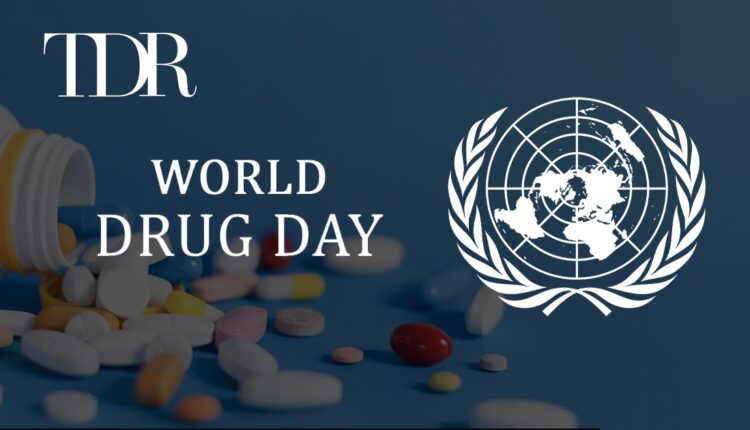
UN Calls for Health-Focused Drug Policies on World Drug Day
The TDR Key Takeaways regarding Health-Focused Drug Policies on World Drug Day:
- What happened: The UN Human Rights Chief issued a statement for World Drug Day on June 26, 2024, urging a human rights-based approach to drug policies.
- History: World Drug Day is observed annually on June 26 since 1987 to promote the fight against drug abuse and illicit trafficking.
- What it matters: The statement emphasizes the need to shift drug policies from punitive measures to health-based approaches, highlighting the human rights implications of current practices.
- What is next: The UN calls for international cooperation to reform drug policies, prioritizing health, human rights, and social welfare.
On World Drug Day, observed annually on June 26 since 1987 to promote the fight against drug abuse and illicit trafficking, the UN Human Rights Experts issued a significant statement urging a human rights-based approach to drug policies. The statement highlights the need to shift from punitive measures to health-focused strategies, underscoring the human rights implications of current practices.
The call from the UN Human Rights Chief emphasizes that punitive drug policies have long been documented to cause severe human rights and health impacts. According to the statement, “For years, UN human rights experts have documented the devastating human rights and health impacts of drug policies over-reliance on punishment, criminalization, and militarization. On World Drug Day 2024, we call for transformative change in drug policy, by shifting from punishment towards harm reduction.”
World Drug Day serves as a crucial reminder of the ongoing challenges in drug policy. The theme for this year, “The evidence is clear: Invest in prevention,” reflects a shift in focus toward evidence-based health interventions. UN experts collectively urged Member States to prioritize health and community-based approaches, stating, “We collectively urge Member States and all UN entities to put evidence and communities at the center of drug policies, by shifting from punishment towards support, and invest in the full array of evidence-based health interventions for people who use drugs, ranging from prevention to harm reduction, treatment, and aftercare.”
The UN’s statement also condemns the historical and ongoing abuses associated with the “war on drugs.” It notes, “The ‘war on drugs’ has resulted in a range of serious human rights violations, as documented by a number of UN human rights experts over the years. These widespread abuses have included compulsory drug detention in the name of ‘treatment,’ over-incarceration and related prison overcrowding, the ongoing use of the death penalty for drug offenses, killings, enforced disappearances, and the ongoing lack of, and unequal access to, treatment, harm reduction, and essential medicines.”
The need for international cooperation in drug policy reform is critical. The statement calls on the international community to address and reverse the damage caused by decades of punitive drug policies. “The international community must seek to address and reverse the damage brought about by decades of a global ‘war on drugs.’ We note that states of exception and the militarization of law enforcement in the context of the ‘war on drugs’ continue to facilitate the commission of multiple and serious human rights violations.”
The UN experts’ statement also emphasizes the need to prioritize prevention and harm reduction over punishment, highlighting various UN agency reports, positions, resolutions, and actions that support this approach. A key example is a “landmark report” published earlier this week by the UN Special Rapporteur on Human Rights, which urges nations to move away from the criminal war on drugs and adopt harm-reduction policies, including decriminalization, supervised consumption sites, drug checking, and the widespread availability of overdose reversal drugs like naloxone. The report underscores that over-criminalization, stigmatization, and discrimination linked to drug use are significant structural barriers that lead to poorer health outcomes, advocating for “alternative regulatory approaches” for currently controlled substances.
A gender-responsive approach and the decriminalization of drug use are crucial for effective policy reform. The statement urges, “The UN, Member States and the international community as a whole should shift from punishment towards support, through a gender-responsive harm reduction approach, the decriminalization of drug use and related activities, and the responsible regulation of all drugs to eliminate profits from illegal trafficking, criminality, and violence.”
Overall, the UN’s call for a human rights-based approach to drug policies on World Drug Day highlights the urgent need to move away from punitive measures and towards health-focused, evidence-based interventions. The global community is urged to prioritize human rights, health, and social welfare in drug policy reform, ensuring a more just and humane approach to addressing drug-related issues. Want to be updated on Cannabis, AI, Small Cap, and Crypto? Subscribe to our Daily Baked in Newsletter!



